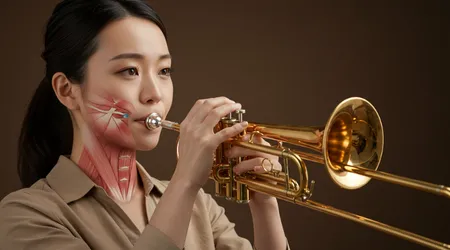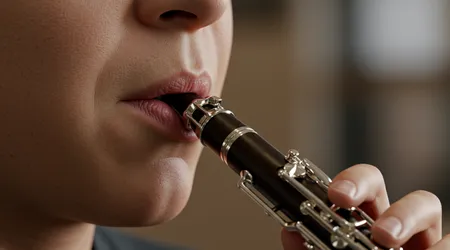Embouchure: How to Avoid Excessive Tension When Playing Wind Instruments

Mouth It's the foundation of a wind instrument's performance, but excessive tension can compromise sound and health. Playing a wind instrument requires technique, control, and care.
Advertisements
THE mouth It's not just the positioning of the lips, but the harmony between facial muscles, breathing and posture.
When poorly practiced, it can cause discomfort, fatigue, and even injury. This article explores how to avoid tension, offering practical tips, technical support, and strategies for musicians of all levels.
Why do some brass players play with ease while others struggle with pain?
Let's dive into this essential topic, with smart and updated approaches for 2025, ensuring a text rich in information and optimized for SEO.
Advertisements
THE mouth It's the starting point for any wind player, whether playing trumpet, saxophone, or flute. It defines the quality of the sound and the musician's stamina.
Excessive tension, however, can turn passion for music into frustration.
This in-depth guide combines proven techniques, practical examples, and a dash of creativity to help you master the mouth without harming your health.
Based on real studies and current practices, we'll cover everything from anatomy to specific exercises, always with a human and engaging tone.
Embouchure Anatomy: Understanding Your Body
THE mouth involves the lips, tongue, jaw, and facial muscles, all working in sync. Straining these muscles causes tension, reducing efficiency.
According to a 2022 study by Journal of Voice, 68% of wind players report muscle discomfort due to poor technique.
The key is balance: the orbicularis oris muscles should be relaxed but firm. Imagine the mouth like a guitar string: tight enough to vibrate, but not so tight that it breaks.
Teeth and tongue also play a role. Irregular dental alignment may require adjustments. mouth, while the tongue guides the airflow.
++ Fretless Guitar: What are the Sound Benefits and Challenges?
Overworked muscles can lead to spasms or even focal dystonia, a neurological condition that affects musicians. To avoid this, know your body.
Check your posture in the mirror: a clenched jaw or raised shoulders are signs of tension.
Another point is diaphragmatic breathing, essential for relieving pressure on the face. Beginning wind players tend to use only their chest, which forces them to mouth.
Practice breathing in deeply, expanding your abdomen to distribute the effort. A simple exercise: exhale slowly while counting to ten, keeping your lips relaxed. This trains control without stiffness.

Techniques to Reduce Tension
Relax the mouth It starts with body awareness. Before playing, do a facial warm-up: massage your cheeks in circular motions.
This increases circulation and reduces stiffness. Also, try yawning gently to loosen your jaw. Small habits like these prepare your body for long sessions.
A common mistake is pressing too hard on the mouthpiece. For example, beginning trumpet players force their lips against the mouthpiece, aiming for high notes. This quickly fatigues them.
See more: Types of Drumsticks and How They Influence Percussion
Instead, adjust the pressure gently, as if you were holding a feather. A study of International Trumpet Guild recommends reducing the force by 20% to improve endurance.
| Technique | Benefit | Recommended Duration |
|---|---|---|
| Facial massage | Relaxes orbicularis muscles | 2-3 minutes |
| Controlled yawn | Loose jaw | 1 minute |
| Diaphragmatic breathing | Improves airflow | 5 minutes |
Take regular breaks. Play for 20 minutes and then rest for five, relaxing your lips. This practice prevents tension buildup and maintains mouth functional.
Also try free-breathing exercises, without the instrument, to train your muscles without pressure.
Posture and Ergonomics: Allies of the Embouchure
Posture directly influences the mouth. Raised shoulders or a bent neck create tension that is reflected in the face.
Keep your spine aligned, as if a string were pulling your head upward. For clarinetists, for example, holding the instrument lightly prevents stiffness in the arms, which can reverberate in the lips.
Use ergonomic chairs and adjust the height of the lectern. A lectern that's too low forces the neck down, compromising breathing.
See also: Tips for Maintaining Wind Instruments in Humid Climates
A saxophonist who ignores this may experience pain after 30 minutes. Correct your posture regularly, using a mirror, or recording your sessions for analysis.
Another aspect is choosing the instrument. Poorly fitted mouthpieces increase tension. Consult a luthier to customize the mouthpiece to your style. mouth.
An ill-fitting mouthpiece is like a shoe that's too tight: you can walk, but it's uncomfortable. Try different sizes and shapes to find the perfect fit.
Practical Exercises for a Healthy Embouchure
Specific exercises strengthen the mouth without causing tension. An original example: the “blow of straw”.
Use a straw to blow air into a glass of water, creating gentle bubbles. This trains breath control and lip relaxation. Do this for two minutes daily.
Another exercise is "lip buzzing." Without the instrument, produce a continuous sound, like a bee. Vary the intensity without forcing your lips.
This training, used by professional trombonists, improves flexibility. Combine it with breaks to avoid fatigue.
Practice slow scales, focusing on sound quality, not speed. For example, flutists might play a C major scale, maintaining long, smooth notes.
This reinforces the mouth and reduces the need for excessive force. Consistency is more important than intensity.
Long-Term Embouchure Care
The health of mouth requires ongoing maintenance. Stay well hydrated, as dry lips increase tension.
Use fragrance-free lip balms to prevent chapping. Avoid caffeine before playing, as it contracts facial muscles.
Consult a speech-language pathologist who specializes in music. They can evaluate your mouth and suggest custom adjustments.
A real-life case: a saxophonist from São Paulo recovered his performance after speech therapy sessions in 2024, correcting chronic tension. Invest in prevention to avoid serious problems.
Quality sleep is also crucial. Lack of rest impairs muscle coordination, increasing tension. Get at least seven hours of sleep a night.
Also, avoid playing right after a heavy meal, as digestion can affect diaphragmatic breathing.
The Soprano Mindset: Relaxation and Focus

The tension in the mouth often comes from the mind. Anxiety about perfect performance leads to unconscious muscle contractions.
Practice mindfulness before playing: close your eyes, breathe deeply, and visualize a clear sound. This reduces psychological pressure.
A practical example: João, an amateur trumpeter, felt pain after 15 minutes of practice.
By adopting a five-minute guided meditation before playing, he relaxed his mouth and doubled his practice time. Techniques like this are simple, yet transformative.
See mistakes as learning experiences. Obsessing over perfect grades increases stress. Record your sessions and analyze them without excessive self-criticism.
Ask yourself: Am I playing to express something or to prove something? This reflection relieves mental and physical pressure.
Conclusion
Master the mouth It's a balance between technique, body awareness, and patience. Avoiding excessive tension requires intentional practice and careful attention to body and mind.
From exercises like straw blowing to posture adjustments, every detail counts. mouth It's like the foundation of a house: if well built, it supports a long and healthy musical career.
In 2025, with resources like speech therapy and postural analysis technology, wind musicians have more tools than ever before.
Invest in your mouth, practice intelligently, and turn challenges into opportunities. What will be your next step to playing with more ease and pleasure?
Frequently Asked Questions
1. How long does it take to develop a relaxed embouchure?
It depends on the musician, but with daily practice, improvements are noticeable in 4–6 weeks. Consistency is key.
2. Can I correct a wrong embouchure after years of playing?
Yes, with patience and guidance. Consult a teacher or speech therapist for gradual adjustments to avoid injuries.
3. What is the best exercise for beginners?
The straw blower is ideal. It trains breathing and relaxation without overloading the mouth.
4. Do expensive mouthpieces improve embouchure?
Not necessarily. Fit to your body is more important than price. Test with a luthier.
